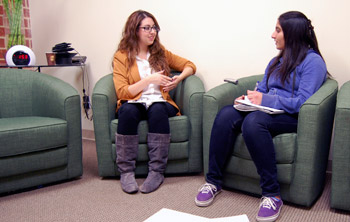I was walking with my friend one day when she told me that she had read on the Internet that one in three teens knows a friend who has been physically hurt by their partner. I couldn’t believe it because you don’t hear about teens being in abusive relationships. However, weeks later at an L.A. Youth staff meeting, we were talking about the tragic death of South East High School senior Cindi Santana, whose ex-boyfriend showed up at her school and stabbed her last September. I was shocked. I couldn’t understand why anyone would hurt their partner, because relationships are supposed to be based on love, trust and respect. I interviewed Melodie Kruspodin, a rape prevention education coordinator at Peace Over Violence, a Los Angeles organization dedicated to preventing dating violence. I learned the warning signs of an unhealthy relationship and how to stay safe.
L.A. Youth: How do you know when a relationship is abusive? Melodie Kruspodin: It can be different for each individual but a lot of times controlling behavior, a strong amount of jealousy. When two people get together really quickly—emotions being really strong early on can lead to things becoming abusive or unhealthy if someone breaks up with the other person, [and] those emotions are still up there.
What are the warning signs of an abusive relationship? Is your partner trying to keep you from talking to your friends or family? Are they sending you 30 texts a day that are: “Where are you?” “Who are you with?” Have you seen them be physical, not only with you but do they hit the wall, things like that? If your partner puts you down, especially in front of people. If your partner tries to control where you go or who you talk to. If you’re afraid to make your partner mad.
Why is it hard to leave an abusive partner? A lot of youth aren’t allowed to date so how do you talk to your parents about being in an abusive relationship if they don’t even know you have a boyfriend or girlfriend. Another factor is peer pressure. If the person you’re dating is considered cool, it might be hard to leave that person. If your partner cuts you off from your friends and family, it’s hard to leave that person if you don’t have a support system. There are also issues of threats. Most commonly the worst physical abuse that happens is after a breakup. That can be a barrier to breaking up with someone if they tell you “I’m going to hurt you” or “I’m going to do something worse if you break up with me.”
Did Cindi Santana’s death seem typical of abusive relationships? Definitely. It takes an average of seven times for a woman to leave her batterer. Unfortunately [sometimes] that seventh time is the woman’s death.
How common are abusive relationships? One in three adolescent girls are victims of some form of dating abuse, including emotional and verbal. And one in 10 are victims of some form of physical abuse.
What is most common—physical, verbal or emotional? Verbal and emotional are the most common. When physical abuse does happen in teen relationships, a lot of times it’s somewhere hidden so that people can’t see it.
Is it common for guys to be abused too? Yes, boys and young men are also the victims of dating violence. There’s a lot of shame and stigma attached to it so that’s why we don’t hear about it as much.
Can you tell me about the Los Angeles Unified School District resolution that passed last fall to prevent teen dating violence? Students have to be taught what is teen dating violence, what are the warning signs and how do you have a healthy relationship. The goal is to have it done in health classes. Part of the policy is also to have at least one person at each campus who would be an expert on teen dating violence who could be there as a resource for students to come to.
How will they know who that person is? It’s supposed to be advertised. This is your prevention coordinator/liaison.
Right now if someone needs help, who should they talk to at their school? A dean or a counselor. [Or] if you have a trusted teacher or other staff. Talking about it is really important, finding someone you trust who you feel you can talk to.
What should you do if you’re in an abusive relationship? They can get more information on our website, peaceoverviolence.org. We also have a 24-hour hotline [626-793-3385, 310-392-8381 or 213-626-3393]. RAINN is a good resource [800-656-HOPE]. I would suggest calling a hotline. Everyone on a hotline is trained.
What can you do as a friend? The most important thing is to be there to listen to your friend, don’t make judgments about what they’re saying. The abuser may be trying to cut you off from your friend so it’s important to be there for them. Be able to give them resources. Be there to listen.
